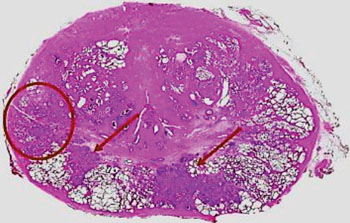Biomarker of Aggressive Prostate Cancer Discovered
By LabMedica International staff writers
Posted on 18 Aug 2016
The level of a specific molecule present in prostate tumors is an indicator of whether the cancer is aggressive and likely to spread and this will aid future clinical tests to help doctors decide how best to treat prostate tumors.Posted on 18 Aug 2016
Many men with prostate cancer have slow-growing tumors that do not require surgery, radiation or other treatments that can leave patients impotent, incontinent or both, but doctors often have difficulty telling the difference between these indolent tumors and those that will prove to be more aggressive.

Image: A whole-mount section of the prostate from a cystoprostatectomy specimen with extension of the urothelial carcinoma of the bladder to the prostate (arrows). The encircled area is an incidental prostatic carcinoma (Photo courtesy of European Urology).
Scientists at the Washington University School of Medicine (St. Louis, MO, USA) and their colleagues obtained radical prostatectomy microarray and clinical data from 910 patients in three published institutional cohorts. The scientists measured levels of Prostate Cancer Associated Transcript 14 (PCAT-14) from prostate tumors after their surgical removal. The scientists found that levels of PCAT-14, a ribonucleic acid (RNA) molecule, were elevated across 180 prostate cancer patients treated at three different institutions.
Analyzing another 910 tumor samples from patients with known treatment outcomes, the investigators also showed that the patients with more aggressive tumors, perhaps surprisingly, had lower levels of PCAT-14. Patients with slow-growing tumors had higher levels of the molecule. That may seem counterintuitive, but according to the team, the data suggest that high levels of this RNA molecule suppress tumor spreading. So when levels decrease, that suppression is lost and the cancer cells are free to metastasize.
The team also showed that low levels of PCAT-14 were associated with poor response to androgen deprivation therapy, a hormone-based treatment for prostate cancer that is less toxic than chemotherapy and radiation therapy. Male hormones, such as testosterone, often drive prostate tumor growth. Depriving prostate tumors of hormonal fuel can slow or stop growth, but some tumors grow even in a state of hormone deprivation.
Christopher A. Maher, PhD, an assistant professor of medicine and senior author of the study said, “We looked at all similar RNA molecules in these prostate tumors and only PCAT-14 was consistently altered in all prostate cancer patients and able to distinguish indolent and aggressive disease. Our study suggests that levels of the molecule called PCAT-14 may be a marker of whether the tumor is likely to be aggressive, helping doctors decide whether to intensify a patient's treatment.” The study was published on July 23, 2016, in the journal European Urology.
Related Links:
Washington University School of Medicine













